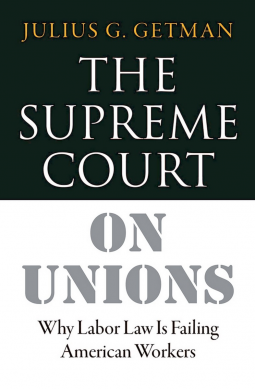
The Supreme Court on Unions
Why Labor Law Is Failing American Workers
by Julius G. Getman
This title was previously available on NetGalley and is now archived.
Send NetGalley books directly to your Kindle or Kindle app
1
To read on a Kindle or Kindle app, please add kindle@netgalley.com as an approved email address to receive files in your Amazon account. Click here for step-by-step instructions.
2
Also find your Kindle email address within your Amazon account, and enter it here.
Pub Date Jun 14 2016 | Archive Date Jun 14 2016
Cornell University Press | ILR Press
Description
Labor unions and courts have rarely been allies. From their earliest efforts to organize, unions have been confronted with hostile judges and antiunion doctrines. In this book, Julius G. Getman argues that while the role of the Supreme Court has become more central in shaping labor law, its opinions betray a profound ignorance of labor relations along with a persisting bias against unions. In The Supreme Court on Unions, Getman critically examines the decisions of the nation's highest court in those areas that are crucial to unions and the workers they represent: organizing, bargaining, strikes, and dispute resolution.As he discusses Supreme Court decisions dealing with unions and labor in a variety of different areas, Getman offers an interesting historical perspective to illuminate the ways in which the Court has been an influence in the failures of the labor movement. During more than sixty years that have seen the Supreme Court take a dominant role, both unions and the institution of collective bargaining have been substantially weakened. While it is difficult to measure the extent of the Court’s responsibility for the current weak state of organized labor and many other factors have, of course, contributed, it seems clear to Getman that the Supreme Court has played an important role in transforming the law and defeating policies that support the labor movement.
Advance Praise
Available Editions
| EDITION | Other Format |
| ISBN | 9781501702730 |
| PRICE | $29.95 (USD) |
Links
Average rating from 4 members
Featured Reviews
 Holly W, Educator
Holly W, Educator
A through and well defended perspective on legal precedents related to unions. Getman does an excellent job analyzing the history of Supreme Court decisions that arguably hurt American workers rather than protect their interests as unions intend to. If you are interested in labor history, this work is worth a read!
 Kel M, Media/Journalist
Kel M, Media/Journalist
Take it to court
The Supreme Court on Unions: Why Labor Law Is Failing American Workers by Julius G. Getman (Cornell University Press, $29.95).
If it seems like labor unions and collective bargaining protections have been taking a beating, then Julius G. Getman argues that it’s the courts—in particular, the U.S. Supreme Court—who’ve been holding the club.
In The Supreme Court on Unions: Why Labor Law Is Failing American Workers, Getman argues that the courts are so divorced from the realities of the workplace that issues like the right to unionize and the right to negotiate working conditions are perceived as unimportant details.
What’s more, it’s not something that started with the Rehnquist court. A professor of law at the University of Texas, Getman traces six decades–yeah, that’s almost sixty years–of rulings that have weakened organized labor, increasing frustration among American workers—even if they don’t recognize the source of the problem. The so-called “liberal” courts of the sixties and seventies were just as bad for workers as the neo-con courts we’ve had since; which backs up his thesis considerably.
While this may be too much legal and court history for the general audience, readers who are interested in the law, labor, and the confluence of the two will find Getman’s book fascinating.
Readers who liked this book also liked:
Silvia Moreno-Garcia
Historical Fiction, Literary Fiction, Sci Fi & Fantasy





